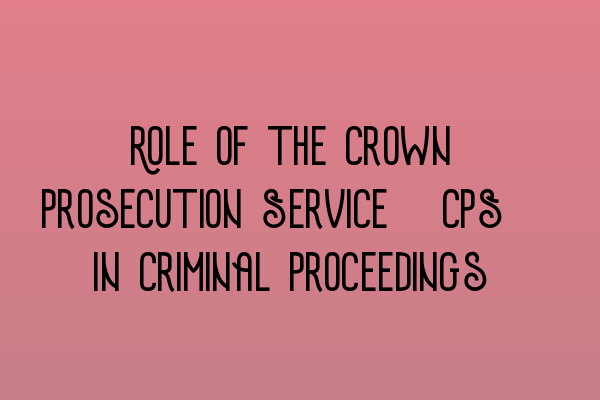Role of the Crown Prosecution Service (CPS) in Criminal Proceedings
Welcome to our SQE Criminal Law & Practice Law UK blog! In this post, we will delve into the important role played by the Crown Prosecution Service (CPS) in criminal proceedings in the UK. The CPS is a key component of the justice system, responsible for prosecuting criminal cases on behalf of the state.
The CPS works closely with the police, gathering evidence and making charging decisions based on the evidence presented. The primary objective of the CPS is to ensure that the right people are prosecuted for crimes committed, and that justice is served. Let’s explore some key aspects of the CPS’s role:
1. Decision to Prosecute
The CPS carefully evaluates the evidence provided by the police to determine whether there is enough to support a realistic prospect of conviction. This decision is made in accordance with the Code for Crown Prosecutors, which provides guidance on the factors to be considered. The CPS strives to ensure that only cases with sufficient evidence proceed to court, reducing the likelihood of wrongful convictions.
For a detailed analysis of criminal evidence rules, click here.
2. Preparing Cases for Court
If the CPS decides to proceed with a prosecution, they are responsible for preparing the case for court. This involves working closely with witnesses, gathering additional evidence if necessary, and ensuring that all relevant information is disclosed to the defense. The CPS follows strict guidelines to maintain transparency and fairness throughout the process.
To learn more about gathering crucial evidence in criminal cases, including methods and techniques, click here.
3. Presenting the Case in Court
The CPS’s role extends to presenting the case in court during trial. Their experienced prosecutors analyze and present the evidence to support the charges. They also act as the advocate for the prosecution, cross-examining witnesses and making legal submissions to the court. The CPS is committed to ensuring fair trials and upholding the principles of justice.
4. Working with Other Parties
The CPS collaborates with various stakeholders involved in criminal proceedings. This includes the police, defense counsel, probation services, and other organizations related to victim support, rehabilitation, and community safety. The CPS strives for effective coordination to enhance the overall criminal justice system.
For an inside look at uncovering UK police procedures in criminal cases, check out our article here.
5. Regular Review Process
The CPS regularly reviews cases to assess the ongoing need for prosecution. Factors such as new evidence, changes in legislation, or public interest are carefully considered. This ensures that cases are always evaluated and the right decisions are made, even after the initial charging decision is taken.
Conclusion
The Crown Prosecution Service (CPS) plays a crucial role in criminal proceedings in the UK. From the decision to prosecute to presenting the case in court, the CPS ensures fairness, transparency, and effective collaboration with others involved. The CPS’s commitment to upholding the principles of justice strengthens the criminal justice system as a whole.
To enhance your SQE Criminal Law study group experience, check out our article here. For a closer look at state prosecution in the UK, read our article here.
Thank you for reading! We hope you found this post informative and valuable. Stay tuned for more insightful content from SQE Criminal Law & Practice Law UK!
